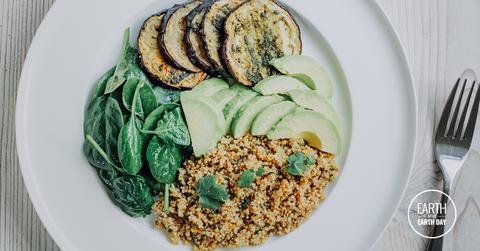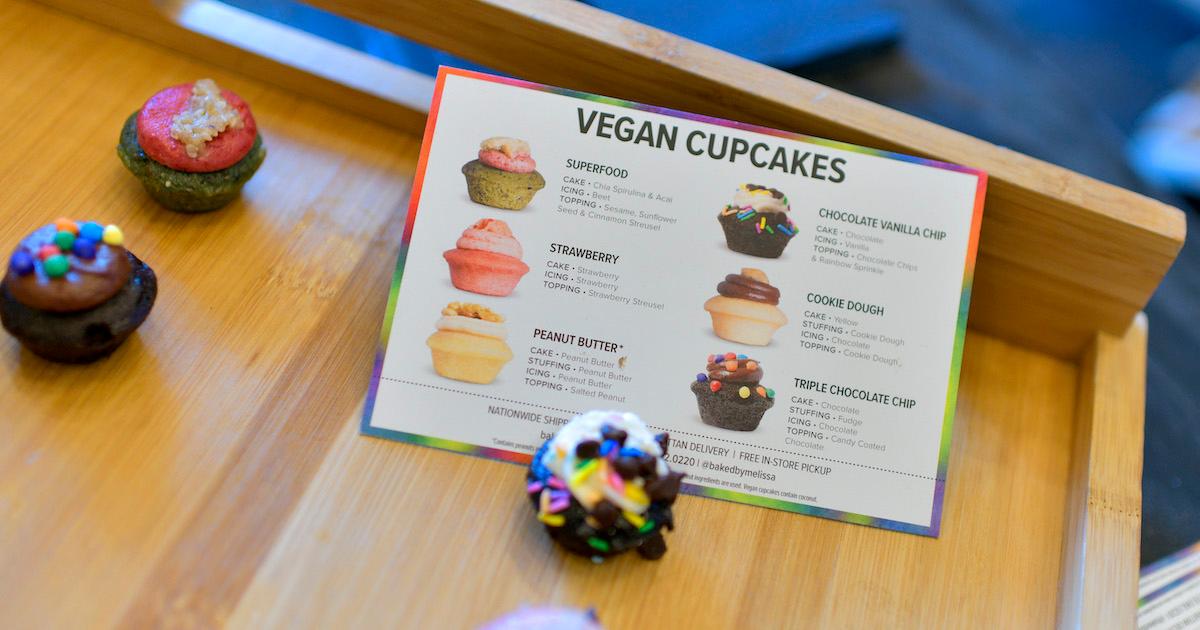How Plant-Based Diets Protect the Earth and Fight Climate Change
There are so many reasons to eat more vegan meals.
Updated July 21 2023, 12:58 p.m. ET

If you've ever asked a vegan why they are vegan, you may be familiar with the three central reasons behind the lifestyle change for most people: the animals, personal health, and the Earth. As more and more information becomes available about the harsh reality of animal agriculture, it's pretty clear why an animal lover might choose to no longer consume animal products.
But how exactly does eating plant-based help the environment?
There have been a number of studies on how plant-based diets benefit the planet in recent years — including one in July 2023 that found that eating vegan produces about 75 percent less greenhouse gas emissions than eating meat. Keep reading to learn more.

How do animal agriculture and factory farming affect the environment?
For some background, every year, an estimated 70 billion land animals are raised and killed for meat, eggs, and dairy, according to Faunalytics. In the U.S., 99 percent of land animals raised for food come from factory farms. And those figures do not include fish, of whom several trillion are killed for food each year, according to Fish Count.
Animal agriculture is responsible for an estimated 18 percent of human-caused greenhouse gas emissions worldwide, according to the report Livestock's Long Shadow, published by the Food and Agriculture Organization of the United Nations. The report added that livestock accounts for 35 to 40 percent of global human-caused methane emissions and 65 percent of global human-caused nitrous oxide emissions, which are two of the most potent greenhouse gases on Earth.
As explained by NASA, greenhouse gases in the atmosphere prevent heat from escaping the planet, which contributes to global heating and climate change.
How does raising livestock actually directly cause greenhouse gas emissions?
One way is via animal waste, such as animal's burps, farts, and feces (with the highest animal waste emissions coming from cows). Not only does that release methane into the air, but feces are also drained into waterways, which can pollute local communities, further increasing factory farming's environmental impact.
Additionally, as Climate Nexus noted, around a third of global grain production is used to feed livestock. (And growing all that grain requires a lot of fertilizer and pesticides, which have their own negative environmental impacts, as per the NRDC.)
If the world went vegan, we could solve the climate crisis.
If humans stopped eating meat, eggs, and dairy, there would still be plenty of grain and food to feed humans. In fact, some experts predict that if we stopped eating animal products and fed all their grain to humans, we could virtually solve world hunger, according to One Green Planet. (Of course, there would be plenty of infrastructure and logistics to work out, but that's just one interesting way to look at the world's hunger problems.)
Furthermore, about a third of the planet's land (not including iced surfaces) is used to raise livestock, and almost 16 percent of the planet's freshwater is used for livestock, according to Climate Nexus.
In a vegan world, we'd be able to use far less resources like grain, land, and freshwater.

A view of vegan cupcakes from Baked by Melissa at Spring Studios during New York Fashion Week: The Shows on Sept. 9, 2019 in New York City.
Research has found that adopting a vegan diet is incredibly beneficial to the environment.
In 2018, a group of researchers at the University of Oxford studied the environmental footprint of livestock, and determined that reducing our consumption of meat and dairy would have a massive impact on the environment. “A vegan diet is probably the single biggest way to reduce your impact on planet Earth, not just greenhouse gases, but global acidification, eutrophication, land use and water use,” researcher Joseph Poore told The Guardian, based on the study's findings.
And in July 2023, another study from researchers at the University of Oxford (among other institutions) looked at the environmental impacts of different diets. For the study, which was published in the journal Nature Food, they analyzed the dietary data of 55,504 people, broken down into vegans, vegetarians, fish-eaters, and meat-eaters, along with environmental data from 38,000 farms, spanning 119 countries across five continents.
The team found that in looking at overall dietary impacts, vegans were responsible for about 25 percent of the greenhouse gas emissions of those who ate at least 100 grams of meat per day. That's 75 percent less GHG emissions.
The study concluded that no matter "where and how food is produced," it's clear that eating animal products has a significant impact on the environment.
"Our dietary choices have a big impact on the planet," stated lead author, Professor Peter Scarborough, as per The Guardian. "Cutting down the amount of meat and dairy in your diet can make a big difference to your dietary footprint."
Going vegan also benefits animals and human health.
On top of the health benefits, being vegan also greatly benefits animals, since going vegan means your diet and lifestyle no longer depends on their exploitation and slaughter.
Plus, thanks to documentaries like Forks Over Knives, What the Health, and The Game Changers, people have become increasingly aware of the health benefits of a plant-based diet.
If you're feeling inspired to eat more plant-based meals to reduce your environmental impact, there are so many easy ways to get started. You could start by simply instituting Meatless Mondays in your home, you could try making one of your three meals a day completely vegan, or you could even sign up for Challenge 22 or Veganuary to try a plant-based diet for 22 days or a month, respectively. No matter how many plant-based meals you're looking to add to your diet, you hold the power to make a difference.
This article, originally published on May 3, 2019, has been updated.